|
|
|
Sort Order |
|
|
|
Items / Page
|
|
|
|
|
|
|
| Srl | Item |
| 1 |
ID:
121198
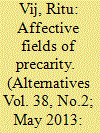

|
|
|
|
|
| Publication |
2013.
|
| Summary/Abstract |
This article explores the affective structure of precarity and its gendered antinomies. Building on feminist critical engagements that call attention to the elision of reproductive and household labor in emergent theorizations of precarity, it draws on Lauren Berlant's work on affective attachments to offer a reading of cinematic narratives of precarity in contemporary Japan, a space only tangentially referenced in a largely Euro-American discourse on precarity. Delineating precarity as an affective field of intelligibility, both inimical to yet potentially enabling of a feminist opening, this article offers an analysis of two films: Japan a Story of Love and Hate shows how the affective normalization of women's precarity privileges the affect of loss for men in precarity, suggesting it is the loss of mastery entailed by the movement of men from once secure to insecure work that mobilizes an affective-political turn under the sign of precarity; in contrast, a reading of Tokyo Sonata as an allegorical treatment of precarity shows how the feminization of men wrought within precarity can open up the possibility for a normative rupture of prevalent gendered hierarchies.
|
|
|
|
|
|
|
|
|
|
|
|
|
|
|
|
| 2 |
ID:
137259
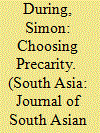

|
|
|
|
|
| Summary/Abstract |
This essay argues that global neo-liberalism has undercut the analytic power of the concept of the ‘subaltern’. It has instead produced a new category: the precariat. It makes this case first by examining Carlo Levi's Christ Stopped at Eboli, which helped define the subaltern, and then by showing that the aftermath of the 1968 revolutions slowly overturned the problematic installed by Levi and the Subaltern Studies group. It ends by offering an account of contemporary precarity via a reading of Amit Chaudhuri's novel, The Immortals.
|
|
|
|
|
|
|
|
|
|
|
|
|
|
|
|
| 3 |
ID:
161127
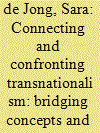

|
|
|
|
|
| Summary/Abstract |
This article traces the trajectory of transnationalism as a perspective and field of study and suggests that new impetus can be given to its development by establishing a dialogue between transnationalism and other key concepts. While the research agenda of the early stages was characterised by a need to distinguish transnationalism from related terms, such as globalisation, we argue that the field could now regain momentum by exploring synergies with other concepts. In this special issue we stage confrontations between transnationalism and, respectively, the (perspectives opened up by the) concepts of ‘borders’, ‘translocality’, ‘precarity’, ‘queer’, ‘moralities’, ‘the state’, and ‘brokerage’. Conceptually, this allows us to go beyond an internal critique that exposes the shortcomings of a transnational perspective, by suggesting novel frameworks and toolkits. Substantively, this issue’s articles demonstrate the need to refocus transnational studies’ attention to the unevenness, instability and inequality of transnational space.
|
|
|
|
|
|
|
|
|
|
|
|
|
|
|
|
| 4 |
ID:
182487
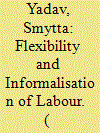

|
|
|
|
|
| Summary/Abstract |
In this article, I demonstrate, through the use of the life course perspective, how informal work in the form of verbal wage contracts might lead to dignity and autonomy amongst the rural poor. The article draws attention to a broader comparative context of how indigenous autonomies are produced. In that they have the relative freedom to engage in a range of informal work as discussed, the Gonds’ autonomy in a neoliberal sense consists of self-governance, which draws attention to the indigenous community’s conception of the self as an economic and autonomous entity that is sustained by a range of social networks.
|
|
|
|
|
|
|
|
|
|
|
|
|
|
|
|
| 5 |
ID:
161707


|
|
|
|
|
| Summary/Abstract |
This article focuses on how people who formerly worked as bonded labourers adapt to the new realities of an insecure capitalist labour market. It examines how the past shapes the uncertain labour situation of the present, including resistance. The article reflects on the current experiences of precarious labour at industrial sites in western Nepal. It describes how former bonded labourers and their descendants have begun working as contract workers in a modern industrial food-processing factory, with the help of contractors related to them by kin. The article further shows that one of the defining features of their new life as contract labourers is its chronic precariousness. Undisguised forms of confrontation, such as open disregard for management instructions, are also part of their new reality in the labour market. Contract labourers are often strongly assertive in the face of managerial authority, and this assertiveness has been shaped largely by either past experiences or memories of bonded labour. The article contributes to debates about bonded labour and its transformations in South Asia. It also offers a reflection on the limited impact of the Nepali Maoist Revolution on precarious labour and on the ethnic dimensions of this segment of Nepali society. Finally, it contributes to discussions about industrialization and Adivasi communities in South Asia and beyond.
|
|
|
|
|
|
|
|
|
|
|
|
|
|
|
|
| 6 |
ID:
151966
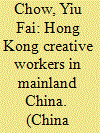

|
|
|
|
|
| Summary/Abstract |
China took up the discourses and agenda of creative industries increasingly in the first post-millennium decade. Amidst the attempt to turn from ‘made in China’ to ‘created in China’, would the translation of the creativity discourse usher in a better society in China? This article serves as one of the probing steps to ascertain what creativity enables and disables in China. I do so in an inquiry that departs from existing scholarship on two aspects. First, it follows a regional, cross-border labour flow. Second, it focuses on the people in the frontline of creative work. My study draws on the experiences of 12 Hong Kong creative workers who moved to Shanghai and Beijing. Their translocal and transcultural encounters allowed me to trace and foreground the particularities of creative practices in China. Like many fellow creative workers, my informants moved north to pursue better career opportunities. But they also wanted to do something more. Some of them managed to do so. At the same time, their stories were punctuated with disappointments, frustrations and continuous adjustments, categorized into what I call the precarious and the ethical. The findings of this inquiry pose questions on the hypothesis, the hype and the hope of creativity in China.
|
|
|
|
|
|
|
|
|
|
|
|
|
|
|
|
| 7 |
ID:
160355
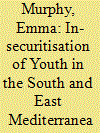

|
|
|
|
|
| Summary/Abstract |
The securitisation of youth as a social category has been well-documented. For the South and East Mediterranean (SEM) countries, moral panics over demographic youth bulges, Islamist radicalisation and protracted conflicts have placed youth centre-stage as a threat to the security of states and societies. Rejecting such assertions as themselves being what Foucault might have termed ‘technologies of power’ in a neoliberal order, and instead taking a critical approach to security, the spotlight is turned towards youth themselves as the referent object of study. This reveals the multidimensional hyper-precarity and insecuritisation of young peoples’ lives which derive from that same neoliberal economic order and the political structures that sustain it in the SEM countries. The finding resonates with other studies of new, insecure, formats for adulthood in Africa and suggests that we should look at the insecurity of young people today to understand global neoliberal futures in countries beyond the post-industrial ‘core’.
|
|
|
|
|
|
|
|
|
|
|
|
|
|
|
|
| 8 |
ID:
169211
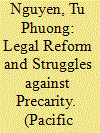

|
|
|
|
|
| Summary/Abstract |
This paper contributes to the literature on precarity in Asia by examining the way in which state law interacts with social, political and ideological factors in shaping experiences of precarity. In contrast with studies of precarity that see law as a set of state regulations underpinning individual workers’ precarious economic and political status, this paper adopts a socially grounded view of law that incorporates workers’ understandings of and engagements with state law in commonplace settings. It also adopts a view of precarity as a complex dynamic of social, legal, and political processes shaping and reproducing workers’ experiences of insecurity and vulnerability at work, rather than a broad, identity-based category of non-standard and informal types of employment. Through an ethnographic study of former state workers’ working experiences in Vietnam, this paper sheds light on different aspects of workers’ collective and individual struggles against precarity and workplace injustice, and the role that law plays in these struggles. It argues that law contributes to reinforcing workers’ precarious experiences, which are underpinned by the tension between their expectations grounded in the socialist era and the realities of workplace injustice and insecurity in a market economy.
|
|
|
|
|
|
|
|
|
|
|
|
|
|
|
|
| 9 |
ID:
182849


|
|
|
|
|
| Summary/Abstract |
This paper is interested in an emerging canon of post-millennial Indian dystopian fiction in English and the related themes of precarity and (im)purity. After introducing some recent novels and texts from the domestic Indian literary scene, the paper looks to demonstrate how precarity, (im)purity and changing ideas of India(nness) are manifested in Prayaag Akbar’s Leila, a 2017 Indian post-millennial dystopian novel in English. To focus on these particular themes, I consider the novel’s urban geography in terms of its modes of segregation, specifically how the walled sectors of the dystopian, near-future metropolis divide a city ruled over by the Repeaters and pervasive surveillance systems, whilst the Slums and the Outroads lie beyond the city limits. This focus on (im)pure involves an examination of representations of class, privilege, freedom of movement and religious affiliation. Overall, this paper is especially interested in how the dystopian as a narrative mode is harnessed in order to recount ‘precarious’ urban existence, a theme that runs through the wider body of post-millennial Indian dystopian fiction. Through discussion of the (im)purity trope and particularly through the narrative mode of the dystopian, I argue that Leila, like other recent Indian works of this genre, tangentially engages with certain socio-political themes of the second decade of the millennium such as segregation and develops ideas of India(nness) in relation to the Indian post-millennial contemporary.
|
|
|
|
|
|
|
|
|
|
|
|
|
|
|
|
| 10 |
ID:
117144


|
|
|
|
|
| Publication |
2012.
|
| Summary/Abstract |
Based on ongoing biographical research of Indonesian migrant workers in the oil palm plantations of Malaysia, this paper explores their different strategies of survival in a sector characterised by an ongoing precarity of livelihoods. The life stories of six workers from Sulawesi, Flores, Java and Sumatra are used to illustrate a tentative typology of migration experiences. As the workers set out from their own specific context of 'surplus population', they are confronted with a migration labour regime that is based on the social and political precarisation of the workers. However, in order to achieve their development aspirations, the workers find different ways of adapting to or circumventing the precarious labour regime. In particular, flight or absconding (lari) is used to change employers, to find better working conditions and to increase wages. Another key strategy is to increase the permanence of their stay, either by choosing illegality or by negotiating retrospective documentation. These strategies lead to the emergence of long-term transnational networks that change the social reality of the migration regime in the oil palm industry.
|
|
|
|
|
|
|
|
|
|
|
|
|
|
|
|
| 11 |
ID:
190425


|
|
|
|
|
| Summary/Abstract |
This article investigates the link between growing precarity – associated with the process of neoliberal economic globalization – and growing Islamist tendencies in Indonesian society, through a case study of app-enabled transport workers. It applies a Gramscian notion of common sense to understand workers’ responses to their experiences of socio-economic marginalization and the articulation of their grievances. The combination of the near hegemony of a neoliberal worldview that encourages individual entrepreneurial prowess and an Islamist focus on moral self-cultivation inadvertently contributes to workers’ normalization of their precarity, furthering the atomization of the workforce. It also helps provide the setting for mobilizations of the urban precariat under Islamic banners, without challenging the imposition of neoliberal ideology on work and life.
|
|
|
|
|
|
|
|
|
|
|
|
|
|
|
|
| 12 |
ID:
080007


|
|
|
|
|
| Publication |
2007.
|
| Summary/Abstract |
Departing from tendencies to bound precarity in particular time periods and world regions, this article develops an expansive view of precarity over time and across space. Beyond effects of specific global events and macroscale structures, precarity inhabits the microspaces of everyday life. However, people attempt to disengage the stress of precarious life by constructing the illusion of certainty. Reflexive denial of precarious life entails essentialist strategies that implicitly or explicitly classify and homogenize people and phenomena, legitimize the constructed boundaries, and in the process aim at eliminating difference and possibilities for negotiation; the tension between these goals and material realities helps explain misrepresentations that can be catastrophic at multiple scales, re-creating precarity. Reactions to 9/11 by the Bush administration represent a case in point of reflexive denial of precarity through strategies that created illusions of certainty with deleterious results. Normatively, the paradox of precarious life and reflexive denials prompts questions as to how urges for certainty in the context of precarity might be constructively channeled. the author approaches this challenge in the final section by drawing from a nexus of concerns about post-Habermasian radical democracy, individual thought and feeling, and network dynamics. Whereas Hardt and Negri reverse the direction of the Foucauldian concept of biopower from top-down to bottom-up, the author draws from Foucault's concept of governmentality in relation to resistance to imagine a cooperative politics operating within as well as across scales
|
|
|
|
|
|
|
|
|
|
|
|
|
|
|
|
| 13 |
ID:
163492
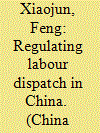

|
|
|
|
|
| Summary/Abstract |
This article suggests cautious optimism toward the prevailing Polanyian countermovement discourse by providing a timely and comprehensive examination of the enforcement of the labour dispatch regulation in China. Since the enactment of the regulation, some enterprises have narrowed the remuneration gap between agency workers and formal employees, while others have retained a large gap in overtime pay, bonuses, and welfare benefits between these two groups of workers. The regulation has reduced the number of agency workers, but has invoked the abuse of the more precarious ‘outsourced’ workers as well. The regulation has had little effect on limiting the use of agency labour to temporary, auxiliary, or substitute positions, raising the requirements of engaging in the labour dispatch business, or stabilizing the employment of agency workers. This article contributes to the extant literature on regulatory enforcement by examining the effects of non-standard employment regulation, highlighting the variance of labour law compliance among enterprises with different types of ownership, and demonstrating how China’s ongoing transformation from a planned to a market economy since the 1980s and from high growth to a new normal since 2010 has fundamentally constrained the full implementation of its labour protection regulation.
|
|
|
|
|
|
|
|
|
|
|
|
|
|
|
|
| 14 |
ID:
151730
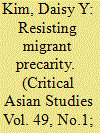

|
|
|
|
|
| Summary/Abstract |
Since 2006, marriage migrants and their so-called multicultural families have been the recipients of considerable public resources and attention in the Republic of Korea. Thus, it could be said that marriage migrants constitute a relatively privileged group of migrants in South Korea. Yet significant human rights abuses, including domestic and sexual violence, widespread discrimination, and poverty, indicate that marriage migrants continue to face various forms of legal, social, and institutional precarity. By evaluating the specific trajectories by which human rights activists and organizations mobilize in the name of migrant rights, this paper argues that human rights-based activism has not been an effective means of mobilizing resistance to migrant precarity because of its failure to address precarity as a multi-layered and multi-sited reality. In consequence, marriage migrants in South Korea have turned to alternative methods for mobilizing resistance to precarity.
|
|
|
|
|
|
|
|
|
|
|
|
|
|
|
|
|
|
|
|
|